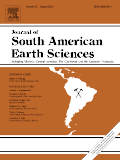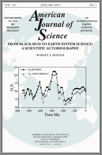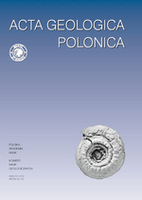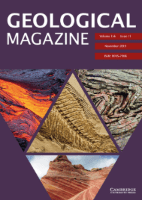
JOURNAL OF SOUTH AMERICAN EARTH SCIENCES
Scope & Guideline
Unlocking the Mysteries of South America's Geological Heritage
Introduction
Aims and Scopes
- Geological and Tectonic Studies:
Research on the geological evolution, tectonics, and structure of South American regions, including studies on orogeny, sedimentary basins, and fault systems. - Paleobiology and Paleoecology:
Exploration of fossil records, paleoenvironmental reconstructions, and the evolution of ancient biota, providing insights into past ecological dynamics. - Geochemistry and Mineralogy:
Investigations into the geochemical properties and mineralogical composition of rocks and sediments, including studies on mineral deposits and resource potential. - Hydrogeology and Environmental Geosciences:
Research focusing on groundwater systems, water quality, and human impacts on geological and hydrological processes, emphasizing sustainable management practices. - Volcanology and Seismology:
Studies related to volcanic activity, eruption dynamics, and seismic hazards, contributing to the understanding of natural hazards and risk assessment in the region. - Remote Sensing and Geophysical Methods:
Application of innovative geophysical and remote sensing techniques to study geological processes and environmental changes across South America.
Trending and Emerging
- Climate Change and Environmental Impact Studies:
Research addressing the impacts of climate change on ecosystems, hydrology, and land use is gaining momentum, reflecting global concerns about environmental sustainability and resilience. - Geospatial Technologies and Machine Learning:
The integration of geospatial analysis and machine learning techniques in geological and hydrological studies is on the rise, enhancing the capacity to analyze complex datasets and improve predictive modeling. - Geochemical and Isotopic Studies:
There is an increasing focus on geochemical and isotopic analyses to understand geological processes, resource exploration, and paleoenvironmental reconstructions, highlighting the importance of these methods in contemporary research. - Sustainable Resource Management:
Research aimed at sustainable management of natural resources, including water, minerals, and ecosystems, is emerging as a critical area of study, aligning scientific inquiry with societal needs for sustainable development. - Interdisciplinary Approaches to Tectonics and Volcanology:
The blending of tectonic and volcanological research with paleoclimatic and paleoenvironmental studies is becoming more prominent, leading to a more holistic understanding of geological processes and their impacts on the environment.
Declining or Waning
- Traditional Mineral Exploration:
Research specifically dedicated to traditional mineral exploration techniques is becoming less prominent, possibly due to the increasing interest in sustainable practices and environmental impacts associated with mining. - Paleoanthropology:
Although still relevant, studies specifically focused on paleoanthropological aspects in South America seem to be declining, as more interdisciplinary approaches are favored that integrate ecological and geological perspectives. - Purely Descriptive Stratigraphy:
While stratigraphic studies remain pertinent, there is a noticeable decline in purely descriptive stratigraphic papers without comprehensive analytical or interpretative frameworks, as researchers increasingly focus on integrating data with geochronology and paleoenvironmental implications.
Similar Journals

DOKLADY EARTH SCIENCES
Advancing Knowledge in Earth and Planetary SciencesDOKLADY EARTH SCIENCES is a reputable journal published by MAIK NAUKA/INTERPERIODICA/SPRINGER, focusing on the dynamic field of Earth and Planetary Sciences. With an ISSN of 1028-334X and E-ISSN 1531-8354, this journal offers a platform for researchers to disseminate their findings and insights that contribute to our understanding of Earth systems over a continuous publishing span from 1998 to 2024. It currently holds a Q3 quartile ranking in the Earth and Planetary Sciences category, reflecting an emerging yet significant impact within its field, evidenced by its Scopus ranks where it stands at 123rd in general Earth sciences and 113th in miscellaneous Earth sciences. DOKLADY EARTH SCIENCES aims to bridge research gaps and foster collaboration among a diverse audience including researchers, professionals, and students committed to advancing knowledge in geoscience. The journal stands as a vital resource for those seeking to explore contemporary challenges and innovations within the realm of Earth sciences.

China Geology
Your Gateway to Cutting-Edge Geological ResearchChina Geology, published by KEAI PUBLISHING LTD, is a leading open-access journal that serves as a pivotal platform for disseminating high-quality research across a wide spectrum of Earth sciences. Since its inception in 2018, the journal has rapidly established itself with an impressive Q1 ranking in multiple critical categories, including Geology, Economic Geology, and Oceanography, among others, reflecting its significant contribution to the academic community. Positioned as a top-tier journal in the Earth Planetary Sciences domain, it ranks #22 out of 321 in Geology and exhibits an admirable impact in sub-fields such as Earth-Surface Processes and Geochemistry and Petrology. China Geology is committed to promoting rigorous scientific inquiry and facilitating the open exchange of knowledge in the geosciences, making it an essential resource for researchers, professionals, and students eager to explore innovative developments and fundamental advances in geology. The journal’s accessibility ensures that critical findings reach a broad audience, thereby enhancing collaboration and driving forward scientific discourse in the global community.

GEOTECTONICS
Fostering Knowledge in the Ever-Changing Landscape of Geoscience.GEOTECTONICS is a distinguished academic journal published by PLEIADES PUBLISHING INC, focusing on key developments in the field of geology. Established in 1978, the journal has dedicated itself to exploring the intricate processes and phenomena associated with Earth's tectonic systems, making substantial contributions to Earth and Planetary Sciences. With an impressive impact factor reflected in its Q2 ranking within the Scopus category of Geology, GEOTECTONICS stands out as a valuable resource for researchers, professionals, and students alike. The journal offers a platform for rigorous peer-reviewed research that spans both fundamental theories and practical applications in geosciences, affirming its significance in fostering academic discourse and advancing geological knowledge. Although it currently does not offer open access, the journal's accessible format and continued publication through to 2024 ensures that it remains at the forefront of geoscientific inquiry.

AMERICAN JOURNAL OF SCIENCE
Uncovering the Secrets of Our PlanetThe American Journal of Science, published by the esteemed Amer Journal Science, stands as a leading platform for groundbreaking research in the field of Earth and Planetary Sciences. With an impressive impact factor and distinguished Scopus rank 34/195 in its category, the journal occupies a prestigious position in the academic community, reflecting its high-quality and influential contributions to scientific knowledge. The journal’s objective is to disseminate original research, comprehensive reviews, and critical discussions that advance our understanding of geological processes and planetary phenomena, supporting scholars and practitioners in their pursuit of knowledge. Despite its traditional publication structure, viewers can explore its rich repository of works dating from 1945 to present, offering a wealth of insights into the dynamic Earth sciences. The journal remains a vital resource for researchers, professionals, and students eager to engage with the latest scientific findings and foster further innovation in the field.

Austrian Journal of Earth Sciences
Connecting Scholars in Earth SciencesThe Austrian Journal of Earth Sciences, published by SCIENDO, is an esteemed open-access journal specializing in the disciplines of geology, paleontology, and stratigraphy. With an ISSN of 2072-7151, this journal has established itself as a significant platform for innovative research and scholarly communication in the earth sciences. Since its inception in 2007, it has continuously expanded its influence, achieving notable rankings in the Scopus database—#113 in Geology, #42 in Paleontology, and #21 in Stratigraphy, demonstrating its commitment to high-quality publications. The journal holds prestigious quartile rankings of Q1 in both Geology and Paleontology and Q2 in Stratigraphy as of 2023, reflecting its impact and relevance in the scientific community. Researchers and students alike are encouraged to explore and contribute to the evolving discourse within this dynamic field, as the Austrian Journal of Earth Sciences fosters collaboration and knowledge sharing across global platforms.

GEOLOGIA CROATICA
Championing Open Access in Earth SciencesGEOLOGIA CROATICA is a distinguished open-access journal published by the Croatian Geological Survey, dedicated to advancing the field of Earth and planetary sciences. Since its inception in 1992, this peer-reviewed journal has become an essential resource for researchers, professionals, and students interested in various aspects of geology. With its robust impact factor and a prestigious place in Scopus rankings, ranking 127th out of 321 in Geology and 77th out of 159 in miscellaneous Earth and Planetary Sciences as of 2023, GEOLOGIA CROATICA maintains a strong international presence. It provides a platform for the dissemination of critical research findings, promoting collaboration and knowledge sharing among the global scientific community. By focusing on high-quality manuscripts that cover geological processes, hazards, and resources, this journal is pivotal for anyone looking to contribute to or expand their understanding of geological sciences. The journal's commitment to open access ensures that invaluable research is accessible to all, fostering a more informed and scientifically engaged society.

ACTA GEOLOGICA POLONICA
Transforming geological discussions into impactful knowledge.ACTA GEOLOGICA POLONICA is a distinguished journal published by the Polska Akademia Nauk, in collaboration with the University of Warsaw's Geology Department. Since its inception, it has served as a vital platform for disseminating innovative research in the field of Geology, reflecting a commitment to advancing scientific knowledge in Earth and planetary sciences. With an ISSN of 0001-5709 and an E-ISSN of 2300-1887, this journal provides a rigorous review process and is classified in the Q3 quartile for Geology as of 2023, indicating its growing influence in the discipline. Despite not being open access, the journal facilitates meaningful contributions that span a range of geological topics from fundamental research to applied sciences, thereby enriching the academic landscape. Researchers, professionals, and students alike are encouraged to engage with the valuable findings and discussions contained within its pages, which continue to shape the future of geological inquiry.

Geologos
Cultivating Curiosity in Earth and Planetary ResearchGeologos is a peer-reviewed journal dedicated to advancing knowledge in the field of Earth and Planetary Sciences. Published by SCIENDO, this Open Access journal has been facilitating unrestricted access to research findings since 2009, ensuring that scholars, professionals, and students can engage with up-to-date scientific discourse without barriers. With an ISSN of 1426-8981 and an E-ISSN of 2080-6574, Geologos is indexed in Scopus, where it currently holds a rank of #111 out of 195 in the General Earth and Planetary Sciences category, reflecting its commendable impact within the discipline. Based in Poland, the journal embraces contributions from international authors, promoting a diverse and inclusive dialogue on topics ranging from geological phenomena to planetary processes. As a Q3 journal in the Earth and Planetary Sciences category, Geologos is committed to enhancing the understanding and appreciation of the Earth's systems, making it an essential resource for those engaged in research and practice within this dynamic field.

GEOLOGICAL MAGAZINE
Illuminating the Past, Present, and Future of GeologyGEOLOGICAL MAGAZINE, published by Cambridge University Press, is a premier journal in the field of geology, renowned for its rich legacy since 1864 and ongoing contributions to Earth and Planetary Sciences. With an impressive Q1 ranking in Geology and a Scopus rank of #70 out of 321 journals, it holds a significant position within the academic community, appealing to researchers, professionals, and students alike. The journal covers a wide array of topics, ensuring a comprehensive platform for the dissemination of cutting-edge geological research. Although it does not offer open access, it remains a vital resource for those seeking to stay abreast of advancements in the field. With an enduring commitment to quality, GEOLOGICAL MAGAZINE stands as an essential outlet for scholarly communication and serves as a catalyst for academic discourse within the geological sciences.

JOURNAL OF THE GEOLOGICAL SOCIETY OF INDIA
Fostering scholarly dialogue in Earth and Planetary Sciences.JOURNAL OF THE GEOLOGICAL SOCIETY OF INDIA, published by Springer India, serves as a pivotal platform for researchers and practitioners in the field of geology. Established in 1979, this journal has been instrumental in advancing geological research throughout India, showcasing both regional studies and cutting-edge global research. With its Category Quartile ranking of Q3 in the geology category for 2023, and a significant Scopus rank of 171 among 321 journals in Earth and Planetary Sciences, it remains a respected source of scholarly activity. The journal is dedicated to the dissemination of original research articles, reviews, and case studies that encapsulate the dynamic scope of geological science, thus contributing to the understanding of geological phenomena. Although currently not offering open access, the journal maintains a commitment to high-quality scholarship and aims to engage a diverse readership, enhancing the knowledge and practice of geology across various disciplines.